Shipbuilder reaps Belt and Road rewards
Fujian Mawei Shipbuilding Ltd, the largest ship maker in Fujian province, has seen remarkable growth in orders from overseas clients since China announced its Belt and Road Initiative, a top official says.
Fujian Mawei Shipbuilding Ltd, the largest ship maker in Fujian province, has seen remarkable growth in orders from overseas clients since China announced its Belt and Road Initiative, a top official says.

Photo shows the new factory of Fujian Mawei Shipbuilding Ltd. [Photo/Xinhua]
"We have seen an increase in the number of clients from the countries and regions participating in the Belt and Road Initiative, including Singapore, Malaysia and the Middle East," says Li Zhenjun, chairman of Mawei Shipbuilding.
"Orders from Belt and Road economies rose significantly to 53 ships in the past five years and accounted for more than 57.6 percent of our total orders," he says.
The company said it has received an order for 12 container vessels from Malaysian and German shipowners, two of which will be delivered by the end of this year.
The big jump of the Fuzhou, Fujian province-based company is also an example of Fujian's closer trade relations with foreign countries and regions, especially with the Belt and Road economies.
Fujian, a coastal province with a population of nearly 39 million people, was named "the core area" of the 21st Century Maritime Silk Road, which, along with the Silk Road Economic Belt, is part of the Belt and Road Initiative. In the past few years, improving transportation links, expanding trade and investments, and developing maritime cooperation have been high on the provincial agenda.
The latest data showed that last year, Fujian's economy grew by 8.1 percent to reach 3.23 trillion yuan (US$470 billion). Foreign trade contributed to one-third of its gross domestic product, reaching 1.16 trillion yuan.
The province's total export-import volume with Belt and Road economies hit 195.37 billion yuan in the first half of this year, which is a 15.9 percent increase compared with the same period last year.
During this process, companies such as Mawei Shipbuilding have also been upgrading and transforming themselves to meet diversified demands from overseas markets.
Earlier this year, Mawei Shipbuilding successfully launched a deep-sea mining vessel, which is the world's first such vessel capable of working at a depth of 2,500 meters.
"It is unique in the world," says Chang Yonghui, deputy head of Mawei Shipbuilding. "Equipped with several cutting-edge and worldleading technologies, this deep-sea mining vessel marks a new step forward in the nation's maritime construction and deep-sea vessel application."
China has been working on core techniques to detect natural gas hydrate in the deep sea and plans to master key skills in its commercial extraction by 2020.
"It is an unprecedented innovation in that the mining vessel integrates the ship, mining and production systems. It will also be an efficient and safe process to work in the deep sea," says Chang.
He says the 227-meter-long, 40-meter-wide vessel will provide living and working space for 200 people and can store up to 39,000 metric tons of ore.
Founded in 1866, Mawei Shipbuilding was one of the country's first shipbuilders. It has pioneered China's modern shipbuilding, marine military force development and aircraft manufacturing.
"Due to the higher order numbers brought by the Belt and Road Initiative, we have moved from being a traditional ship manufacturer to a high-end and high-tech shipbuilder," he says.
To better suit the rising demands from Belt and Road countries and regions in the future, the company said it is beefing up efforts to develop new types of vessels. Huge demand in emerging markets, including the Belt and Road markets, is expected for such vessels as seafood processing and delivery vessels.

